So Many Types of Eggs, But Which Ones Should I Buy?!

Never get another bad egg. 🥚
Ever wonder why there are so many different types of eggs? Different colors, different prices, different sizes. How do you know which kind to buy?! It’s a little egg-stra if you ask me, so I did some digging to find out everything there is to know about this egg, that egg, and the other one.
Here are 6 types of eggs and what makes each different from their other protein-packed friends:
1. Conventional eggs
If you’re like most people, you’ve probably been buying conventional eggs for years. They’re usually the cheapest option and are always generously stocked at grocery stores.
Conventional eggs are laid by chickens that have been raised in small cages or overfilled henhouses, where they often never see the light of day. The chickens are usually fed grain-based food and have likely been given hormones and antibiotics as they are more susceptible to disease in the crowded environment that they’re raised in.
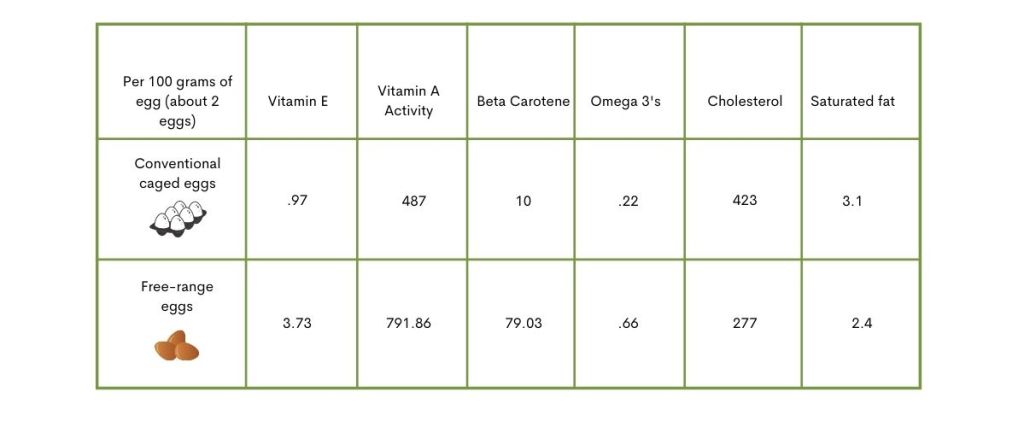
Some claim that this treatment doesn’t affect the egg’s nutritional value, but many studies have shown that caged chickens produce eggs with fewer nutrients than free-range eggs. The graph above shows a study conducted by Healthline that measured various nutrients found in eggs and it’s a bit surprising!
The typical cost of conventional eggs: 90¢-$1.50/dozen
2. Cage-free eggs
Cage-free eggs are the next step above conventional eggs when it comes to the conditions they are raised in. In order for a company to claim that its eggs are cage-free at retailers, every hen must have at least 120 square inches of space.
Cage-free chickens are still raised indoors in large, open barns, but they have much more room to roam, and also usually have access to nest boxes to lay their eggs. There are no dietary standards for cage-free eggs much like conventional eggs, so their diets probably consist of corn and grains.
The typical cost of cage-free eggs: $2.50-$4.50/dozen
3. Free-range eggs
Let the chickies run free! Free-range eggs come from hens that can venture outside of their barns and act more like they would in a natural habitat. The hens are required by the HFAC Certified Humane standards to have a minimum of two square feet of roaming space outside.
With room to roam outdoors, hens can roost, scratch, dust-bath (the natural way chickens clean their feathers), and even feed on plants and insects for sustenance. Their diet still consists mainly of grains but what they eat outside might make their eggs a little more nutritious.
The typical cost of free-range eggs: $4-$7/dozen
4. Pastured eggs
With access to at least 108 square feet of outdoor roaming space, pasture-raised hens are able to feed on grass, leave the barn at any time (weather permitting), and are never given antibiotics.
Pastured eggs contain at least twice as many Omega-3s and other vitamins compared to conventional eggs, and you can actually tell the difference in nutrients by the darker yoke color. Since pastured chickens require more space and work on the farmer’s end, they’re a bit pricier than other types of eggs.
The typical cost of pastured eggs: $5-$10/dozen
5. Organic eggs
Unlike conventional, cage-free, and pastured eggs, organic eggs come from chickens that are on a strictly organic diet free of pesticides, antibiotics, and GMOs.
Some organic egg farms raise chickens in cage-free environments, while others allow for a free-range living space, which impacts the cost of the eggs. Similar to pastured eggs, you’ll notice a darker yolk color with organic eggs as they also contain more nutrients than conventional eggs.
The typical cost of organic eggs: $4-$7/dozen
6. Vegetarian eggs
These eggs are pretty self-explanatory. The chickens live off of a vegetarian diet with no fish or meat byproducts and are kept inside so they don’t consume insects.
While vegetarian eggs might sound like an alluring and healthy option, it’s good to keep in mind how a meatless diet affects the hens. Since they are natural omnivores, depriving them of the nutrients from insects and other meats can actually cause quite a bit of stress, and even lead to “angry chickens”.
The typical cost of vegetarian eggs: $3-$4/dozen
Let’s unscramble a couple of common egg misconceptions….
You’ve probably seen brown eggs and farm-fresh eggs right next to all of their other egg friends at the store and maybe you’re like me and thought they were more nutritious egg options, but you (and me) are quite mistaken.
The “farm-fresh” label is essentially just a clever way for farmers to market their eggs in a more appealing way and it doesn’t mean that they’re healthier or received any kind of special treatment on the farm.
Little is known about how chickens who lay farm-fresh eggs are treated so it could very well be no different from how chickens who lay conventional eggs are treated.
So, what makes brown eggs so special?!
They’re almost always more expensive than white eggs, but why? The color of the eggshell actually varies depending on the chicken breed and it has little to do with their diet or the environment they were raised in.
Certain breeds like red-feathered hens naturally produce brown-pigmented eggs, while others produce white and even blueish green-colored eggs. Red-feathered hens usually weigh more and require more food than white-feathered hens, which makes them pricier for us at the store.
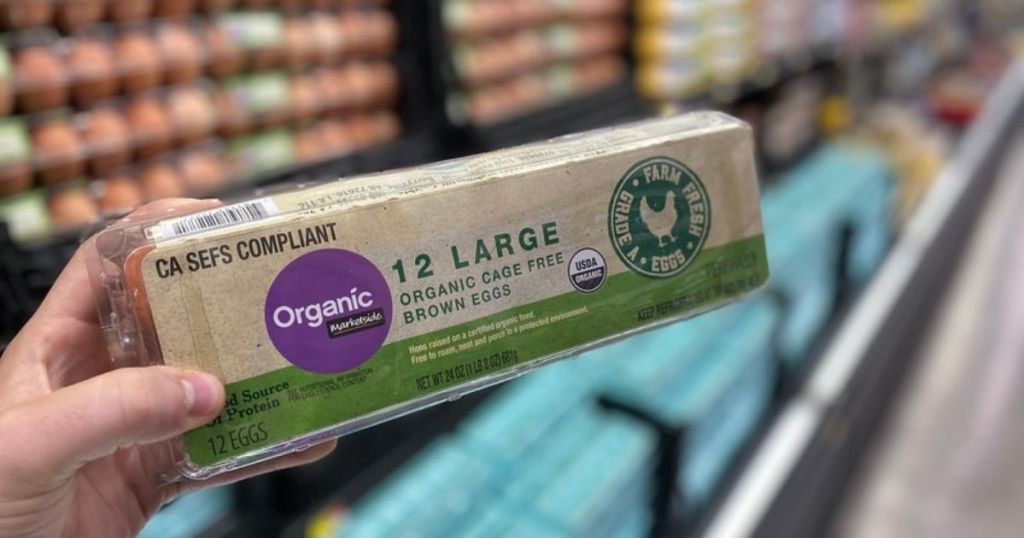
Feel like an egg-spert yet?
Now that you know a little more about all of the different types of eggs, you can make a more informed decision about which kind you want to take home and enjoy with some sizzling bacon.
At the end of the day, your food choices are your own and we’re certainly not egg-shaming anyone!
Once you’re all stocked up on eggs, you’ve got to try this tasty bacon, avocado, and egg salad recipe!


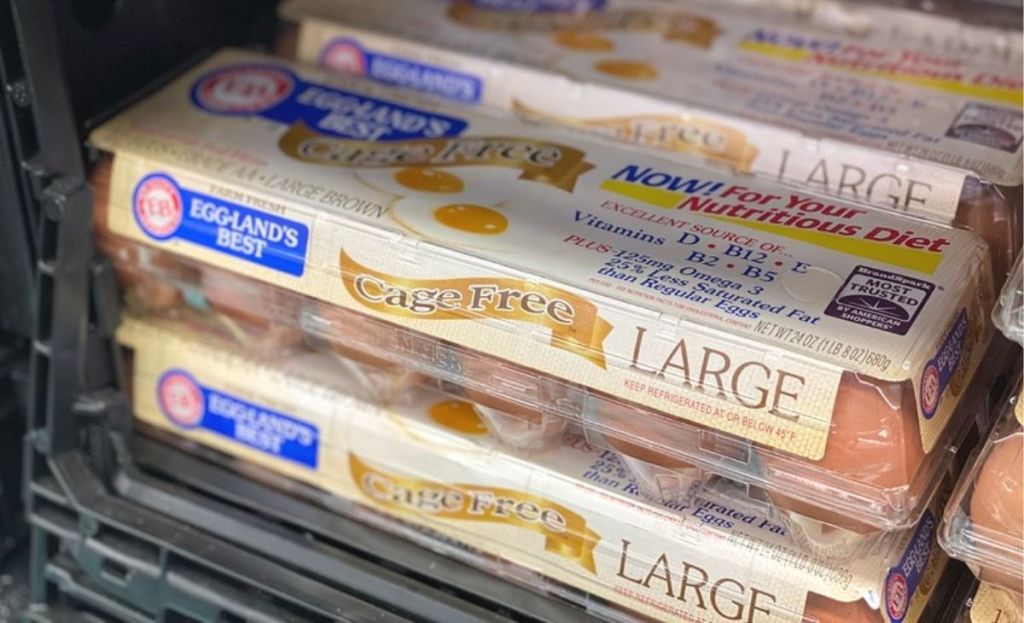

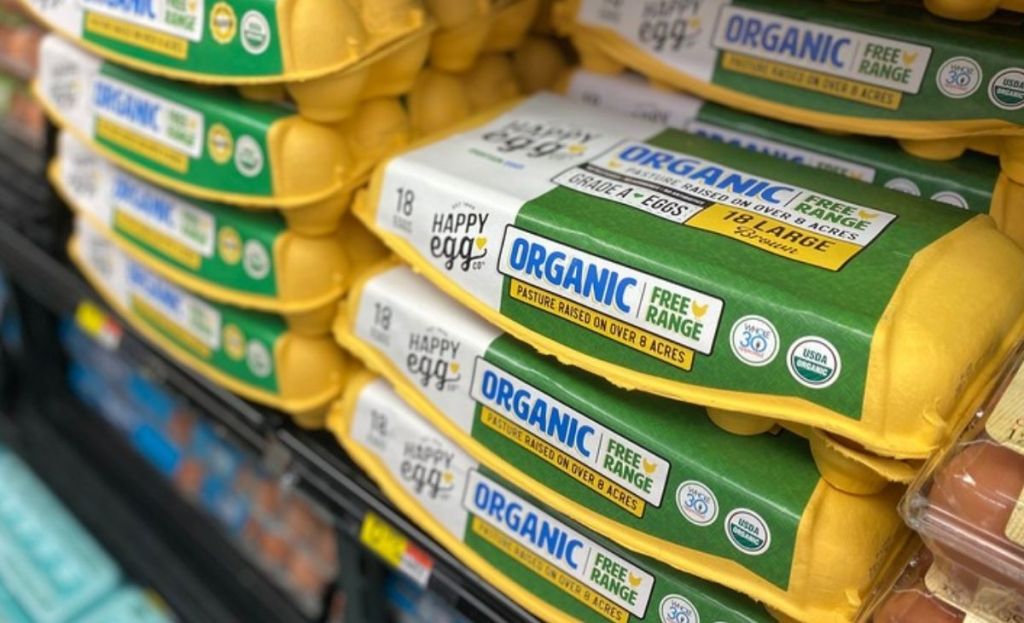
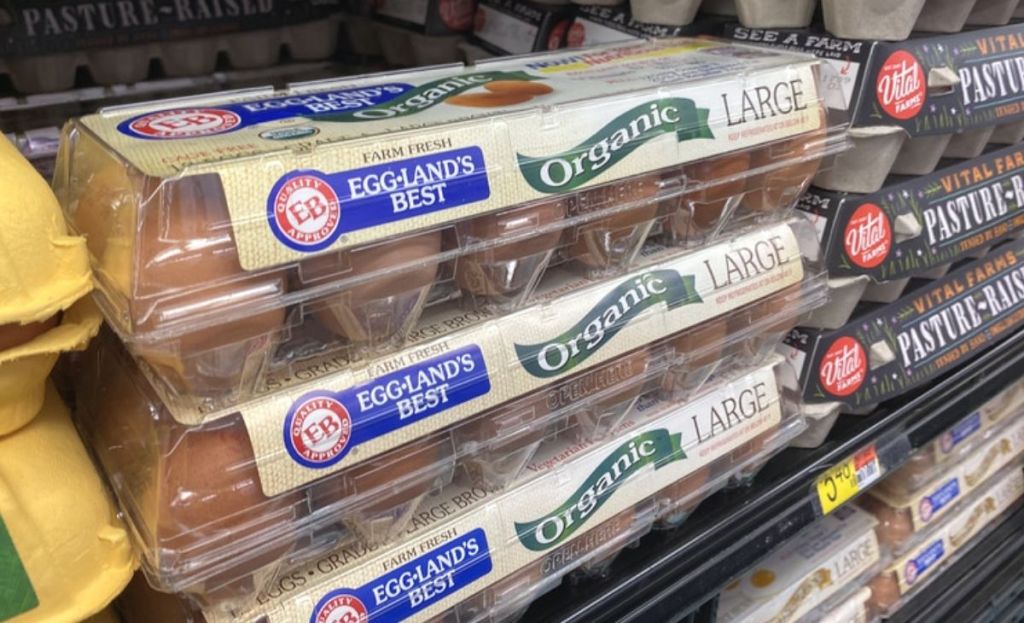
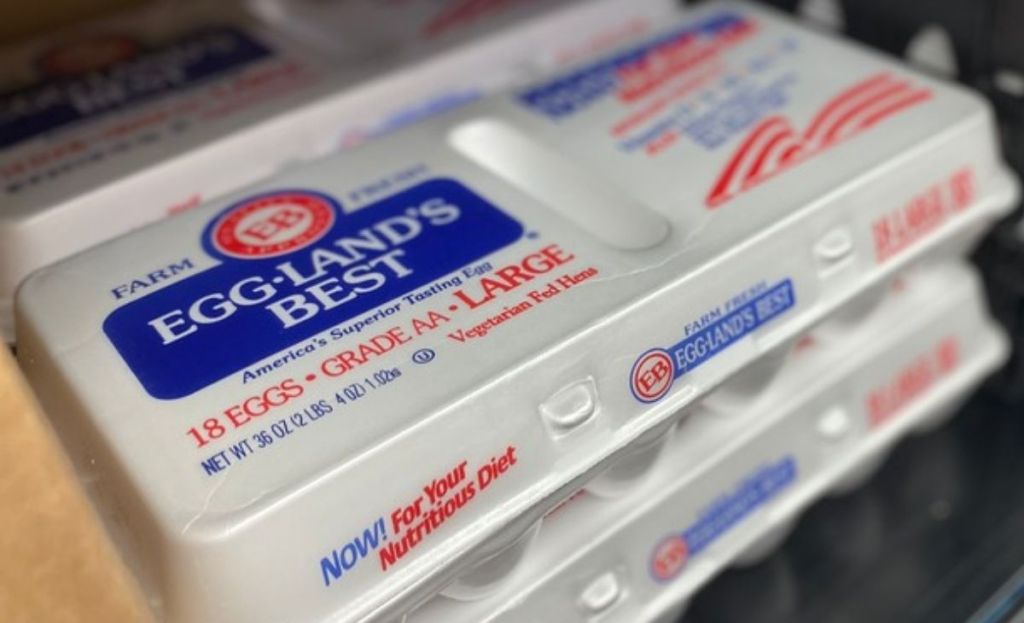
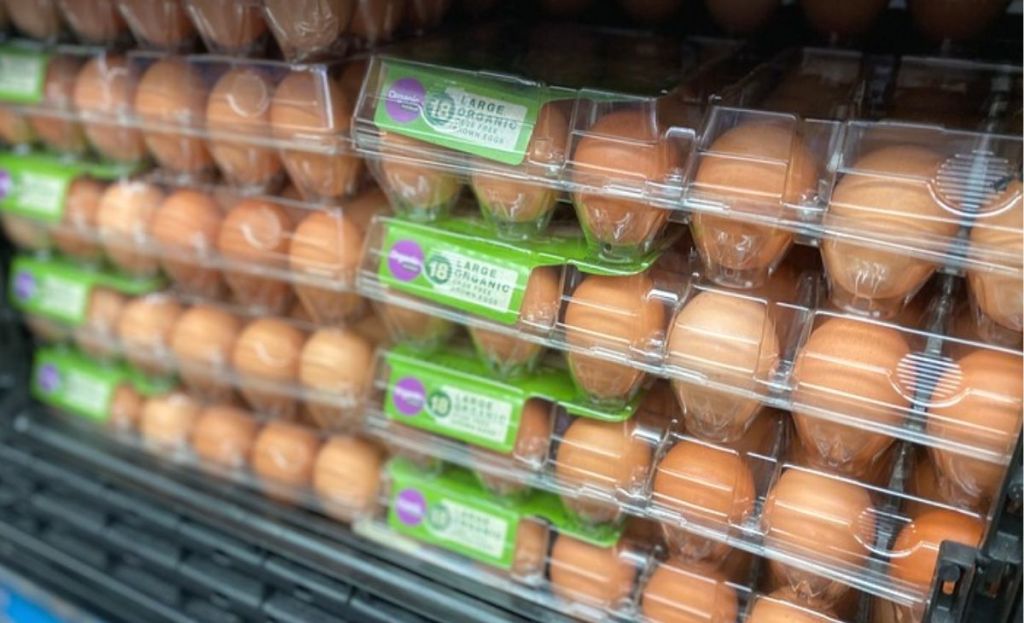


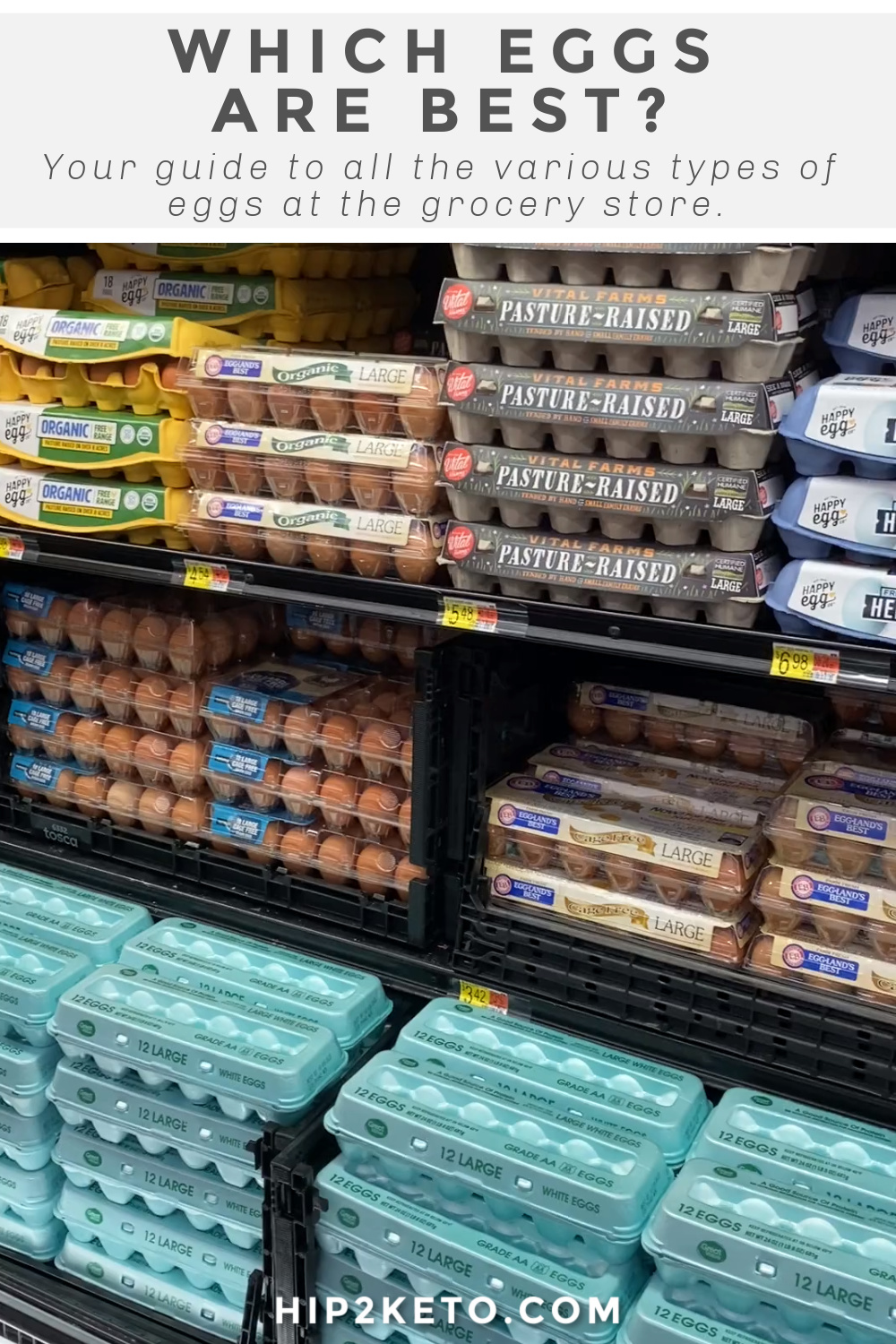
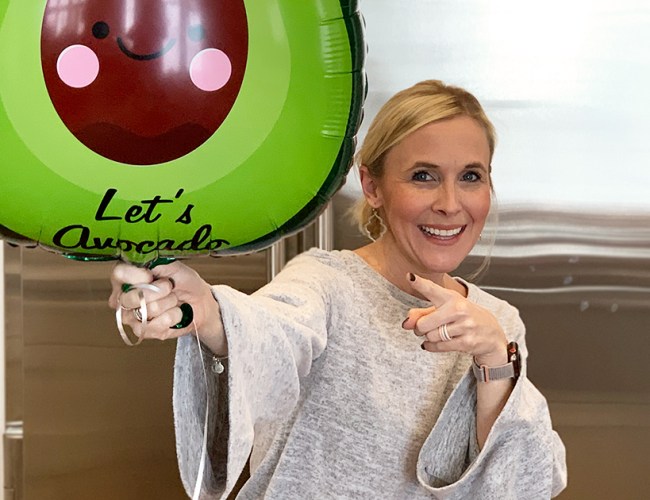
We buy directly from a a lady who raises about 20 chickens. Ask around, you’d be surprised where you can source them from. They are organic and free- range. The taste is night and day to Costco’s organic eggs that we used to buy. Yes, the yolks are a yellow-orange color showing all the nutrition from being grass fed! Lots more healthy fats and HUGE difference in taste. Yummy! 🙂
Duck eggs are also good, They are a much larger egg but VERY rich! Try them!
The chicken eggs really only last for the 3 seasons (we live in the Seattle area). In the winter, they don’t lay much and we revert back to Costco organic eggs until Spring! 🙂
Enjoy!! 🙂